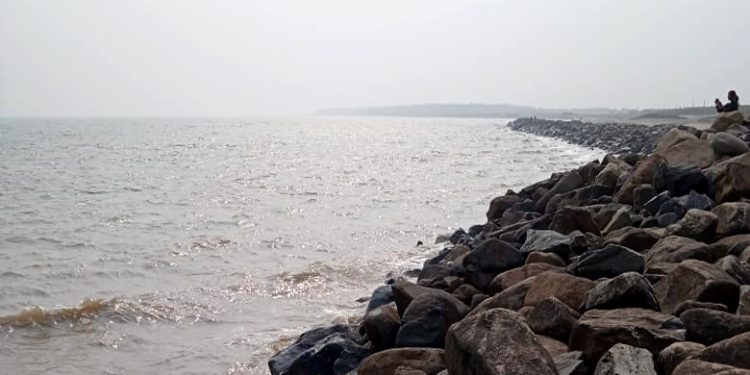Kendrapara: The fear of tsunami to 64 seaside villages under Rajnagar block in this district has come to haunt the residents as the geo synthetic tube sea walls built at Pentha coast have failed to check coastal erosion due to onslaught of high tides, a report said.
The pounding tidal waves have become very rough nowadays. The sea waves have gnawed away at a large volume of the rocks and stones packed inside the gabion nets and threatened to topple the tube. The gabion nets have also been torn in the high tides.
As a result, the 200 mtr long sea beach has been reduced to 20 mtrs over last one and half years. The continuous damage of geo tube seawall has also sparked fear on the visit of the rare Olive Ridley turtles to the sea coast of the district and on the fate of 64 tsunami prone villages.
The damage of the geo tube seawall has proved the fear of naturalists true. In 2019, attending a workshop on sea erosion in Kendrapara town, marine expert Dr K Nageswar Rao of Andhra University had said the geo-tube walls are not the long-term solution to save the coastlines from erosion. The geo tube walls can only be a temporary anti-erosion measure. Now his fear has come true a year later.
Social activist Khitish Kumar Singh said the coastlines at Pentha were eroded by 13 mtrs in 1999. Prior to this, the coastline was getting eroded by six to eight mtrs.
The state government decided to check the sea erosion by constructing geo synthetic tube walls in 2008. He apprehended that 64 villages which are tsunami prone will soon be extinct from the map of the district if the coastal erosion continues at this rate.
Notably, A 600-metre geosynthetic tube wall under the Integrated Coastal Zone Management (ICZM) programme was built at a cost of `34 crore with technical support of IITChennai to protect the seaside Pentha village and its nearby areas from high tides, cyclones and even tsunami.
It was then expected that the geo synthetic tube sea walls will protect over 35,000 residents residing in 64 villages near Pentha coast from the onslaught of tidal waves. It was even claimed that a new beach will be created after the construction of the geo synthetic tube wall.
It has been over three years since the geo synthetic tube wall was constructed but it has failed to check the erosion of the coast. The sea has only become rough nowadays instead of remaining calm.
The high tidal waves have washed away the large stones and rocks packed inside the gabion boxes of the geo synthetic tube walls. It has even sandcast over 2 sq km of area nearby during this period.
The construction of the geo synthetic tube wall at Pentha was the fallacious effort of the authorities to save the areas from the onslaught of the marching sea. Geo-synthetic tubes have failed in the past in Pondicherry, Kerala, Tamil Nadu, and Digha in West Bengal and even at Pentha, said Hemant Rout, secretary of Gahirmatha Marine Turtles Conservation and Mangrove Protection Society.
He claimed that the area was not witnessing much erosion before the construction of Paradip Port but the coastal erosion has only intensified in recent days following the stone packing undertaken for the Paradip Port.
He said there is a need for more assessment of the sea coast and growth of mangrove forests is the primary solution to the problem. The area which was earlier opened for tourists now stands closed after two youths drowned in the sea. He demanded to invite the marine experts and find a solution to the problem.
When contacted, ADM Basant Kumar Rout said that the coastal erosion has been informed to the state government.
PNN







































